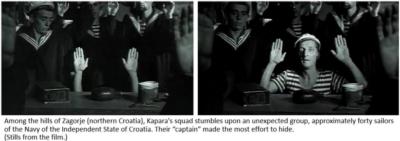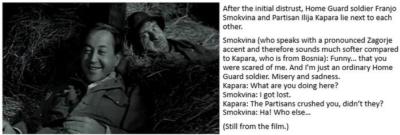Joza Horvat's Tomcat under the Helmet (part 2): On the Home Guard

Dr. Julka Mešterović recorded in her wartime diary the following exchange between the famous Partisan commander Koča Popović and an unnamed colonel of the Home Guard:
Popović: Do you know that we captured your entire regiment with two Partisan battalions?
Colonel: I know. (…) If you were the commander of my army, and I of yours, I would also perform miracles.
Mešterović interprets the fact that two units of Partisan soldiers won a victory over a group of Home Guard soldiers over twice as numerous as proof of the heroism of her comrades. However, the fighting value of the Home Guard—the conscripted land army of the Ustasha-led Independent State of Croatia—was, according to their German allies, always low. And according to the Partisans, it was often so low as to be laughable. As funny and sometimes likeable cowards, the soldiers of the Home Guard entered the cultural memory of the Second World War in Yugoslavia.
A little in his memoir Witness to Transience and much more generously in the novel Tomcat under the Helmet Joža Horvat mocked them. Remembering the group of captured Home Guards, in his memoir Horvat describes them as a huddled herd of frightened sheep. As the unit’s political commissar, he spoke to them about the importance of Partisan warfare, mostly in relation to the crimes of the occupying armies. And they, he wrote, stared at him almost bleating. Maybe they were the inspiration for the scene of the capture of the Navy unit in the hills of Zagorje or the character of the Home Guard soldier Franjo Smokvina who encounters Ilija Kapara, the protagonist of Tomcat under the Helmet, in the hayloft of an unnamed village in Zagorje county. The author describes the intensity of Smokvina’s fearfulness when he finds out that Kapara is a Partisan:
Poor human heart! Poor timid Home Guard heart! It almost stopped, it almost stopped beating. For the second time in these few minutes, he jumped out of the hay, startled, not knowing what to do. To flit like a bird and fly away from the hayloft, to turn into a mole and bury itself and disappear forever?

Smokvina stays with Kapara. He has estimated that his chances of survival are better that way, at least until he gets closer to his native village, where he can then hide. In the end, however, like many other members of the Home Guard (for example, Vodenjak, mentioned in Part 1), Smokvina himself becomes a Partisan. That is, in the novel, one of the countless cowards from the county of Zagorje, laughed at due to their fearfulness, becomes a soldier of the heroic liberation army. And in reality, Horvat managed to convince eight members of the Home Guard belonging to that group of frightened sheep to join the Partisans.
Bibliography
Horvat, Joža. Mačak pod šljemom [Tomcat under the Helmet]. Zagreb: Naprijed, 1989.
Horvat, Joža. Svjedok prolaznosti [Witness to Transience]. Zagreb: Neretva, 2005.
Mešterović, Julka. Leakrov dnevnik [The Doctor’s Diary]. Belgrade: Vojnoizdavački zavod, 1968.
Skrigin, Žorž, dir. Mačak pod šljemom [Tomcat under the Helmet]. Sarajevo: Bosna film, 1962. DVD.
